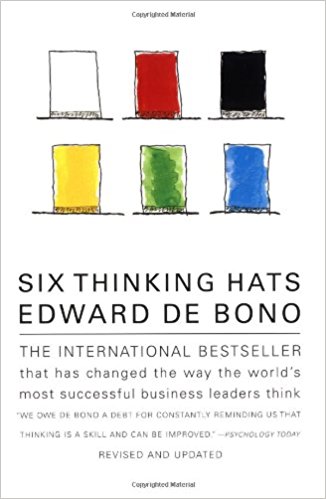Six Thinking Hats Summary

5 min read ⌚
 Always deal with one concept at a time don’t rush things, even if you are a prominent member of the group!
Always deal with one concept at a time don’t rush things, even if you are a prominent member of the group!
A notion forgotten by many members who overestimate their influence and tend to go on their own.
Who Should Read “Six Thinking Hats”? And Why?
The book is especially intended for that part of the population which “dives deeply into dangerous waters” of entrepreneurship.
Lawyers, managers, and investors will surely enjoy the easygoing writing style of Edward and his viewpoints.
About Edward de Bono
 Edward de Bono is a Maltese-born entrepreneur, writer, consultant and an individual who holds college degrees in medicine and psychology.
Edward de Bono is a Maltese-born entrepreneur, writer, consultant and an individual who holds college degrees in medicine and psychology.
He was born on 19 May 1933, in Malta. St. Edward’s College in Malta granted him a medical degree, and he obtained an MA in psychology from Rhodes Scholar.
After receiving many honors, he got to a stage to teach in prestigious universities like Oxford, Harvard, and Cambridge.
Edward wrote more than forty books; among them, you can find masterpieces like I am Right, You are Wrong; The Happiness Purpose and Teach Your Child How to Think.
“Six Thinking Hats Summary”
People are familiar with two types of challenges when they strive to resolve some problem or to overcome an unpleasant situation. You probably know the first obstacle already – The Ego. Don’t consider ego as something wrong; you should understand how your personality affects your decision-making ability.
It is composed of an ambition to succeed, to oppose someone or something, and to underline the mistakes made by other people out of confusion and misunderstanding.
The ego is a mix of emotions and phenomena which regularly judge other people based on their opinion, appearance, education creativity, intelligence, etc.
Sometimes for a person, it is better to disregard emotions like logic, hope, and creativity to cope with the difficulties of today. The “Six Thinking Hats” will help you to carry out meaningful analyses that will aid you in the managerial processes by focusing only on the most important issue of all.
The hats are reckoned as visualization tools that associate to each of our brain functions.
Transform your mindset completely – For instance, if a group of people at a meeting consistently criticizes and make negative comments about other members, you should advise them to remove those “black thinking hats.
These hats emphasized caution and risk analysis as their essential attributes; the “yellow ones,” signify hope, bliss, and optimism.
In general, it all depends on what you seek; it doesn’t matter whether you have superior or inferior egoic state of mind, what does matter is how you cope with life.
On account of prosperity, you should choose your hat and understand the benefits and disadvantages that any hat carries. Enter into the thinking process entirely, your appeal for a positive viewpoint will not threaten other person’s egos.
Simplify your life not just your thinking – It is so much better to focus on one thing at a time, the juggling thoughts are not helpful. Control your emotions and intuition for the benefit of peace and inner harmony.
According to Edward de Bono, people from all races, nationalities, cultures, and outlooks are invited to use his “Thinking Hats method. “It grants each person access to all sorts of information quickly and conveniently. De Bono’s visualization tools are not only helpful to deemphasize vanity but also, they point out a direction to one sporadic nonjudgmental decision-making approach.
Each chapter, each paragraph in the book contains a comprehensive explanation of the attributes that every different hat color has. Plenty personal examples and stories are used to assist readers on how to use these hats when communication occurs.
You have probably heard that rationality confronts the creative hemisphere of human’s mind. Creativity is something profound which destroys the idea of a concept.
Thinking is also a changeable concept; occurs even in sleep mode. Edward de Bono educate individuals of the variable nature of things and their development.
All of the six hats represent a unique self-developed mindset. Mindsets are a dangerous phenomenon; they can be your best friend or your worst enemy. The shape of your world defines them and indicate the amount of collective opinion that dwells in you.
Contradictory attitude is not the solution, oppose the robotic methods, and fight for your business to reach a state of freedom and financial balance. The societal restraints are influential elements in the business community.
Therefore, the real struggle begins when you feel apt to the destroy these constraints once and for all.
You have the freedom to employ them in any order, but it is an imperative to start and end with the blue one.
Key Lessons from “Six Thinking Hats”
1. White Hat; Red Hat
2. Black Hat; Yellow hat
3. Green Hat; Blue Hat
White hat
A non-color illustrates an impartial state of mind. White hat way of thinking is realistic; it assimilates examples and information.
Red hat
This method is opposite of the white one. Red is the color of creation, love, and perception. The “red hat” signifies the importance of feelings and how are they influencing our decisions.
Black hat
Represents cautious mentality; this is the hat which is often overused. In the meantime, black hat has a task to recognize any potential difficulties and tries to avoid them.
Yellow hat
100% symbolic of sunshine and brilliance; it also represents optimism. The yellow and black hat are balanced somehow.
Green hat
Manifests “productivity and growth.” If you feel creative, the “green hat” is the perfect fit for you.
Blue Hat
Blue indicates real authority. For instance, in a meeting, the “blue hat” emphasizes the group’s facilitator.
Like this summary? We’d Like to invite you to download our free 12 min app, for more amazing summaries and audiobooks.
“Six Thinking Hats” Quotes
We may have a perfectly adequate way of doing something, but that does not mean there cannot be a better way. So we set out to find an alternative way. This is the basis of any improvement that does not fault correction or problem-solving. Share on X The need to be right all the time is the biggest bar to new ideas. It is better to have enough ideas for some of them to be wrong than to be always right by having no ideas at all. Share on X In Socrates' dialogues, there was no constructive outcome. He saw his role as simply pointing out what was wrong. Share on X Simplicity before understanding is simplistic; simplicity after understanding is simple. Share on X There may be more danger in prejudices which are apparently founded in logic than in those which are acknowledged as emotions. Share on XOur Critical Review
In our humble opinion, Six Thinking Hats differ from other personal development books because it offers concrete evidence and tips that are both applicable and practical.
In such regards, we feel like this book speaks to any person, who’s aware of the self-imposed concepts that shape his presence and future.








